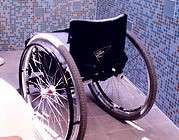Assessing the Impact of Assistive Devices on Employment Opportunities

The Impact of Assistive Devices on Personal Injury Plaintiffs
Often times, especially after suffering a
serious injury,
personal injury plaintiffs must utilize assistive devices in order to complete day-to-day tasks. This consideration should be included in establishing a plaintiff’s damages, as the assistive device will both be costly and could impact other areas of the plaintiff’s life, such as employment. A vocational expert can help answer the question of whether or not an assistive device will present a barrier to employment, and how this will affect the plaintiff’s potential lost wages.
Types and Considerations of Assistive Devices
Assistive device include canes, walkers, wheelchairs, scooters, prosthetics devices, and orthotic devices. An injured individual has many options when it comes to choosing an assistive device, and the best one will fit their particular injury and lifestyle. Especially considering the span of devices available, use of an assistive device is not necessarily an absolute barrier to employment.
Evaluation by Vocational Experts: Assessing Impact on Employment
A vocational expert will consider a number of determinants in evaluating how an assistive device could affect an injured or disabled individual’s prospects for employment. These include the skill level and physical demands of the job, as well as environmental considerations. Skilled workers tend to have more autonomy in carrying out their job duties than semi-skilled and unskilled workers and therefore have more flexibility in completing tasks. For example, a Human Resource Manager who needs to use a cane as a result of an injury can probably choose how she engages with other employees. She likely spends more time at a desk or even has an office, and she may choose to maintaining an “open door” policy rather than having to walk to other offices. On the other hand, a warehouse employee who needs a cane does not have the same flexibility and opportunities to establish her own ways of engaging employees.
Skill Level and Physical Demands in the Workplace
The physical demands of a job may also present challenges to employees with assistive devices. For example, the warehouse employee likely has job tasks that require lifting and handling. These might be difficult or impossible while holding a cane. Sometimes, physicians place recommendations on circumstances when a cane or assistive device is necessary. For example, the injured worker might need to use a cane only when ambulating longer distances (such as a city block). In this case, the cane would not present a barrier to either the warehouse worker or Human Resource Manager.
Environmental Considerations and Workplace Challenges
The work environment may present a barrier to those with assistive devices as well. There are some settings where someone utilizing a cane could present an unreasonable safety hazard to themselves or potentially to others. For example, it might not be appropriate for the warehouse employee to walk around dangerous moving machinery or unprotected heights that might be present in the warehouse. This may not keep her from working, but it could limit the job tasks she is able to perform.
A vocational expert establishes the skill level, physical demands, and environmental characteristics of jobs an injured or disabled individual is qualified for. He then considers other factors and determines whether the individual can perform suitable jobs while using the assistive device they need.
OAS
Edmond Provder, an Occupational Assessment Services, Inc. (OAS) owner, is a Certified Rehabilitation Counselor. He has worked as a vocational expert witness for over forty years and has extensive experience documenting the effect of assistive devices on employability and earning capacity. Contact OAS at 800-292-1919 to discuss how we can help in your case.
Disclaimer: The information on this website and blog is for general informational purposes only and is not professional advice. We make no guarantees of accuracy or completeness. We disclaim all liability for errors, omissions, or reliance on this content. Always consult a qualified professional for specific guidance.








